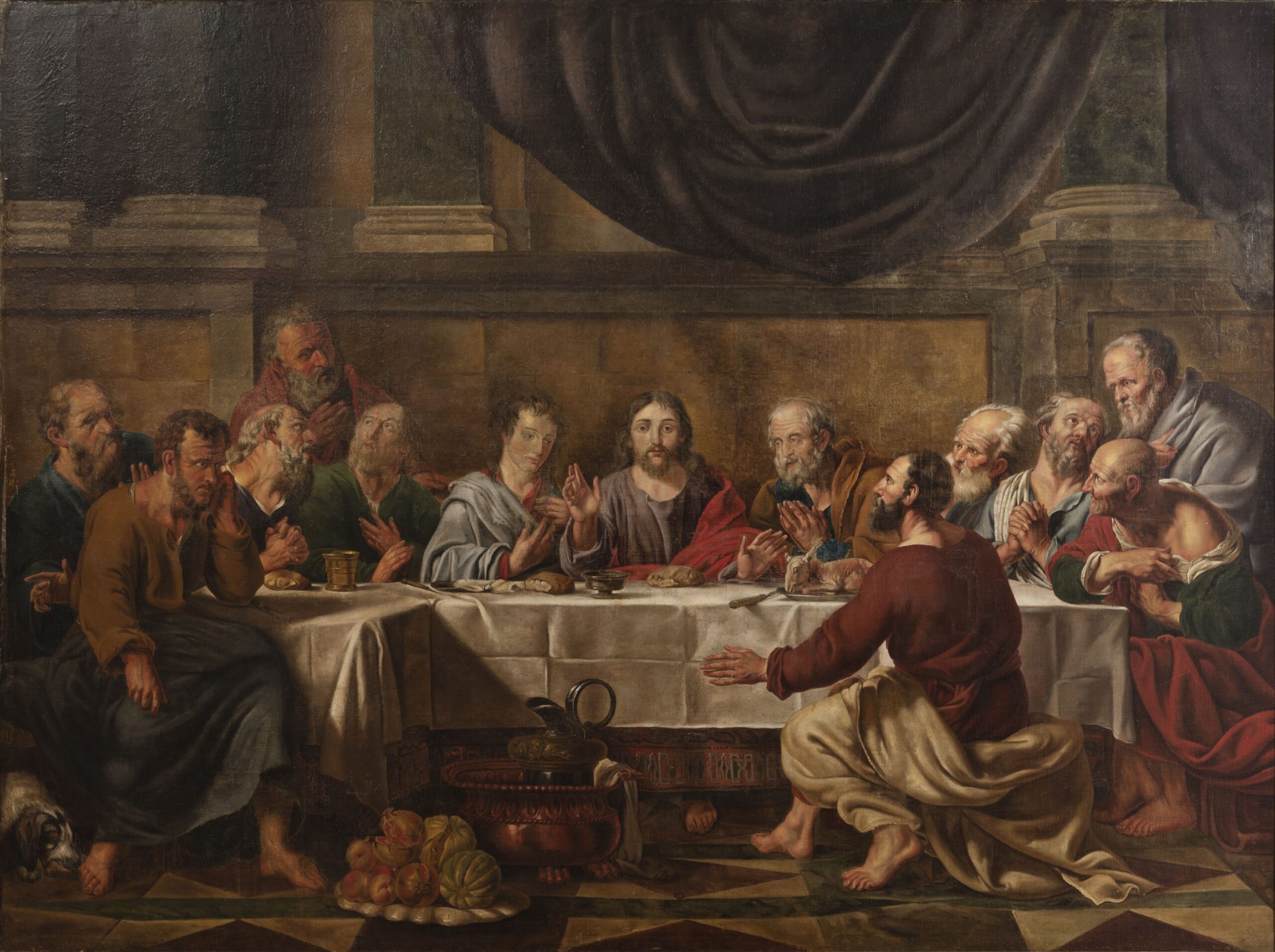The Last Supper by Willem Jacob Herreyns (1743-1827)
Examine yourself.
When you hear this, what do you immediately think? Examine yourself in what way? In regard to your health? Attitude? Behavior? Your job performance?
This command could refer to many things. You would not know what this referred to unless you asked, “In what way?”
And so we come across the Apostle Paul telling the church at Corinth to examine themselves. This is in the context of the Lord’s Supper. Included are some quite dire consequences:
23 For I received from the Lord what I also delivered to you, that the Lord Jesus on the night when he was betrayed took bread, 24 and when he had given thanks, he broke it, and said, “This is my body, which is for you. Do this in remembrance of me.” 25 In the same way also he took the cup, after supper, saying, “This cup is the new covenant in my blood. Do this, as often as you drink it, in remembrance of me.” 26 For as often as you eat this bread and drink the cup, you proclaim the Lord’s death until he comes.
27 Whoever, therefore, eats the bread or drinks the cup of the Lord in an unworthy manner will be guilty concerning the body and blood of the Lord. 28 Let a person examine himself, then, and so eat of the bread and drink of the cup. 29 For anyone who eats and drinks without discerning the body eats and drinks judgment on himself. 30 That is why many of you are weak and ill, and some have died. 31 But if we judged ourselves truly, we would not be judged. 32 But when we are judged by the Lord, we are disciplined so that we may not be condemned along with the world. (1 Cor 11:23-32)
For the vast majority of Christianity today, the Lord’s Supper is the few minutes in the Sunday church service where some sort of wafer (bread) and grape juice or wine (cup) are offered. We also call this communion. Usually someone will say some words about Jesus and the cross, read a scripture, say a prayer. Some churches focus on this time more, some less, some very infrequently.
Sometimes the very passage cited above will be read as a reminder to the church of the seriousness of partaking in the body (bread) and blood (cup) of the Lord. This is all well to do.
But here’s the rub.
When you are sitting in your chair with the bread and cup in your hands, and the person at the pulpit reads verses 27-30, what goes through your mind? How do you examine yourself, to make sure you do not take communion in an unworthy manner?
There are many interpretations as to what this means and what one should do at this moment. Some say you should think about your past week considering all the times you fell short. This includes things you did that were wrong, and things you did not do that you knew were right. Some say you need to have a heart of repentance concerning any sin done in that week. Some even say you need to confess all such sins before eating the bread and drinking the cup, or else you should not do it—because of Paul’s warning.
While these things may be well intentioned, none of these things is what Paul had in mind, at all.
In what context does Paul say, “Let a person examine himself”?
Paul says not to partake of communion in an “unworthy manner,” and “let a person examine himself.” Why? For anyone who eats and drinks without discerning the body eats and drinks judgment on himself. So you would want to know what he means by discern “the body,” because you don’t want to bring on God’s judgment. And because Paul used “body” to describe the bread (body/bread and blood/wine), you may think it refers to Jesus’ broken body.
But it doesn’t. That’s not the “body” he’s talking about.
In order to understand what Paul means by “body,” and so to unlock his true intention, we need to back up and read what Paul said at the beginning, before all this.
17 But in the following instructions I do not commend you, because when you come together it is not for the better but for the worse. 18 For, in the first place, when you come together as a church, I hear that there are divisions among you. And I believe it in part, 19 for there must be factions among you in order that those who are genuine among you may be recognized. 20 When you come together, it is not the Lord’s supper that you eat. 21 For in eating, each one goes ahead with his own meal. One goes hungry, another gets drunk. 22 What! Do you not have houses to eat and drink in? Or do you despise the church of God and humiliate those who have nothing? What shall I say to you? Shall I commend you in this? No, I will not. (1 Cor 11:17-22)
The first thing to notice is that the Lord’s Supper was not a brief moment in the church service as we do mostly today. It was a gathering at which there was a meal (just like how Jesus and the apostles were eating a meal when he instructed how to remember him). And during this meal-gathering, Jesus singled out bread and wine by which to remember him. This is what the first century church knew and practiced. There is no biblical context for communion, or singling out the bread and wine, outside of the Lord’s Supper meal-gathering.
This is necessary to understand because it is what delivers the interpretive power as to what Paul means by discerning the body.
The “body” Paul refers to here is not the broken body of Jesus on the cross represented by the bread, but the body of Christ at large—meaning the church, the people.
The Corinthians were disregarding one another, the church, the body. When they met for the Lord’s Supper meal-gathering, they were just eating their own meals, if they even had one, and not waiting for or sharing with others. People were going hungry. People were being humiliated in this way. Paul calls this despising the church of God. Paul says this is far from what the Lord’s Supper is about and scoffs that they would even call it such.
To solidify the context, Paul’s ends his instruction by saying,
33 So then, my brothers, when you come together to eat, wait for one another— 34 if anyone is hungry, let him eat at home—so that when you come together it will not be for judgment. About the other things I will give directions when I come. (1 Cor 11:33-34)
What is this all about?
Unity of the body of Christ. Loving one another. Looking after one another. Taking care of one another. Being concerned about one another’s well-being.
Just a chapter before, Paul says,
16 The cup of blessing that we bless, is it not a participation in the blood of Christ? The bread that we break, is it not a participation in the body of Christ? 17 Because there is one bread, we who are many are one body, for we all partake of the one bread. (1 Cor 10:16-17)
We who are many are one body.
So now, back to what Paul means to examine yourself and discern the body.
The only interpretation which is supported by the context is that Paul wanted the Corinthians to examine themselves in light of their love and concern for the brothers and sisters around them.
Was anyone lacking? Was anyone starving? Was anyone sick? Did anyone need medical help?
Or were they ignoring others, and just doing their own thing, eating by themselves, not sharing their food or other means, not caring?
We who are many form on body.
To examine yourself and discern the body means to examine yourself at the time of the Lord’s Supper in light of your concern for the brothers and sisters around you, taking note of the well-being of the body of believers. Not to do this is to partake in communion in an unworthy manner, because it is the exact opposite of all that Jesus stood for and taught. It makes one guilty of the body and blood of Jesus because Jesus died for the least of us. Should we show no care or concern for those Jesus gave his life for?
Does this mean that you should not take stock of your past week and your personal sin at the time of the Lord’s Supper? No. But that is not what Paul is talking about here. Nor is it what he is instructing anyone to do. To claim such is at the least to put words into Paul’s mouth he did not say, and at the worst to invent a new doctrine based on inference that binds people to something beyond what is written.
There are many ways one could imagine that would amount to taking the bread and cup in an unworthy manner, but again, these unmentioned ways are not why Paul wrote what he wrote.
Paul expected the church to love one another. Take notice of one another. Care for one another. Especially when remembering the one who died for the least of us. This is the heart of Jesus.




This has long bothered me, this admonishment not to eat or drink of the cup in an unworthy manner seems to be taken out of context AND blown out of proportion. It seems to be used more as an exhortation to shame and guilt rather than a remembrance of Christ, it seems to be a remembrance of sin. I’m not talking about remembering ourselves as we were but dwelling upon our failures and retaking our sin from Jesus who has already forgiven it dwelling upon it and then partaking of the body of Christ. Do you have an unconfessed sin? Yeah, we probably all do. We’ve all been angry with somebody (murder) looked at an attractive person (lust, fornication), wanted something for a moment (coveting, thief), told a lie – even a minor one. We’re told to be guilty of one is to be guilty of all, so you overate, you glutton, hedonist, homosexual, murderer. I don’t think this is what Jesus intended nor is it what even the oft legalistic Paul intended. Paul was talking about not getting drunk and gorging yourself, which isn’t even close to a risk given the dry, lonely communion that is celebrated now with a tiny cracker and thimble of grape juice. It seems a poor way to remember Christ who implored us to do this to remember Him. We remember our sinful nature, think about how awful we are and then in shame and guilt we partake of the body of Christ, a tiny dry cracker, which is broken for you, in one measly crunch, this is the new covenant in my blood, the cheapest grape juice from the grocery store, not even wine, poured out for you, barely a swallow, poured out for many? How? And then we sing, the taste of the half swallow of the world’s cheapest grape juice still on our tongue.
Sure, it can be only for those who know and would remember Christ and His sacrifice and we shouldn’t take the whole tray back to our seat and eat all of the crackers and drink all of the juice but does the verse really say more than that?
The church is clear: Jesus is small, dry, unsatisfying, cheap, meager and in short supply. Don’t you dare try to get more than me or you’re in danger of hellfire. You must dwell on your own inadequacies and fix them in your own power before coming before Christ to partake of body and blood. Don’t you dare remember him if you aren’t perfect or pretty close. Jesus is for the righteous who examine themselves correctly and have nothing to see. Jesus is for the bland. Once made miserable you can have a taste of our awful “meal”.
Was Paul saying more than stop getting drunk, hoarding food and alienating your fellow believers? Or are we doing the same thing now except instead of some of the people getting fed, nobody does. Instead of some people being in communion, nobody is. Instead of some of the people getting drunk on wine, nobody gets wine.
Yes, the form of communion that happens in most churches today is not anything like what we see in the scriptures. The “bread” and “wine” have been isolated from the Lord’s supper, which has no scriptural basis. The form of Sunday gathering has dictated the form of communion, unfortunately. At any rate, all your concerns are legitimate.